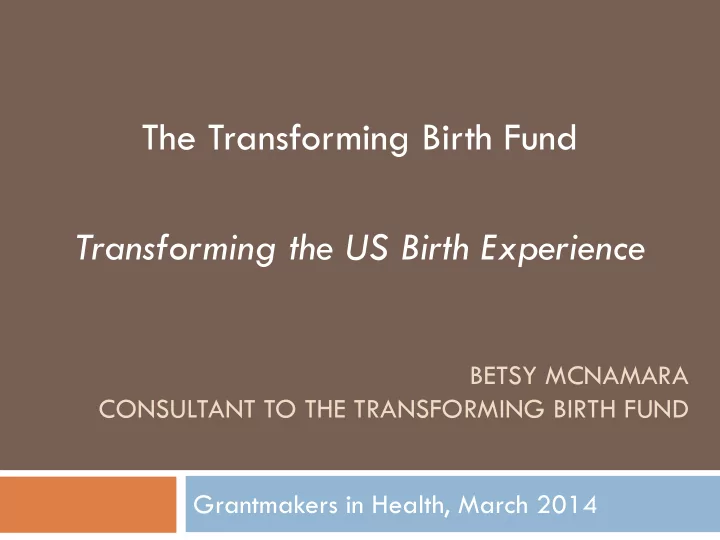

The Transforming Birth Fund Transforming the US Birth Experience BETSY MCNAMARA CONSULTANT TO THE TRANSFORMING BIRTH FUND Grantmakers in Health, March 2014
What is a Donor Advised Fund? Donor gives money to the NH Charitable Foundation Has ongoing say in what grants are made Most administrative and financial operations managed by the NH Charitable Foundation
My role Issue expert Solicit proposals Review proposals Recommend funding Be the face of the Transforming Birth Fund
Vision All women have access to the level of maternity care they want and need, and maternity care systems support them in doing so.
“OUR SYSTEM IS SET UP AS THOUGH YOU HAVE AN ORAL SURGEON PROVIDING ROUTINE TEETH CLEANINGS. ” -DR. MICHAEL KLEIN, OB
Transforming Birth Fund Leverage Points: Media Impacting Policy and Practice Supporting the Movement Research and its Dissemination Individual change makers
Elective Inductions
Image of Jazz game
Elective Labor Inductions: Less than 39 Weeks Gestation 35% 30% Elective Deliveries 25% 20% 15% 10% 5% 0% Jan '01 Feb Mar Apr May Jun Jul Aug Sep Oct Nov Dec Jan '02 Feb Mar Apr May Jun Jul Source: Intermountain Health Care Institute for Health Care Delivery Research
Commonwealth Fund Case Study: Intermountain Health Care Improved Changes in Data Outcomes & Practice Lower Cost
Our maternity model costs us Payers of Maternity Care Medicaid 43% 57% Private Insurers or Consumers
Insert Times Logo here
US Maternity Costs Are Rising Commercial Insurance Payments for Birth by Type 2004 & 2010 $30,000 $25,000 $20,000 Vaginal Birth $15,000 Cesarean Birth $10,000 $5,000 $- 2004 2010
Enforce Evidence-Based Practices Adhering to Evidence based practices lead to the triple aim Improve outcomes Improve quality Lower cost
Grantee Highlights
Grantee: Yale University School of Nursing Decreasing Cesarean Section Rates through Promoting Primary Vaginal Birth Holly Powell Kennedy, PhD, CNM, FACNM, FAAN YALE Department of OB/GYN Grand Rounds January 17, 2013
Obstacles to First-time Vaginal Birth Perception that cesarean is “normal” Cost and quality of Childbirth Education Fear of litigation Time & patience Lack of respect for woman’s decisions Inconsistent respect and/or power differentials among clinicians
Supports to First-time Vaginal Birth Women’s confidence & desire for vaginal birth Childbirth Education is an expectation & affordable or free Patience Women’s sense of power Strong respect, collaboration and teamwork among clinicians
Study Conclusions
Grantee: Childbirth Connection
No More Elective Inductions before 39 weeks
Cesarean Rates have stopped growing but still too high
Grantee: MAMA Campaign
Cost Comparison 2011 Birth Center Vaginal Birth Cost: $2,277 2011 Hospital Vaginal Birth with No Complications Cost: $10,657
Recommend
More recommend